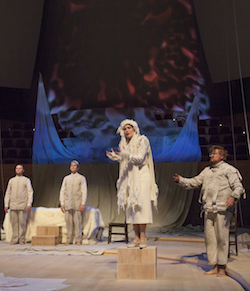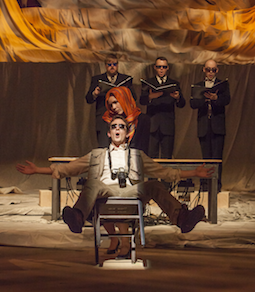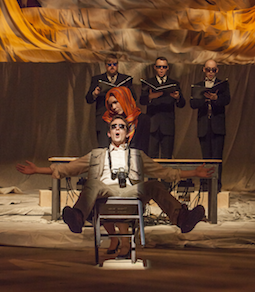
Photos by Joel Simon
Reactions to composer Jonathan Berger and librettist Dan O’Brien’s double-bill world premiere of Theotokia and The War Reporter, two chamber operas about individuals haunted by inner voices, will vary depending upon the value placed on treatment of text and emotional import. Heard on the first of their two-night run in Stanford University’s Bing Concert Hall, both works attempted to take advantage of Bing’s theater-in-the-round architecture and overly resonant acoustic to bring us inside the heads of the operas’ central male protagonists as they experienced hallucinations.
In Theotokia, expanded from a song cycle that Dawn Upshaw premiered at Spoleto Festival USA in June 2010, the hallucinations were the visions of a straightjacketed schizophrenic, Leon (countertenor Geoffrey Williams of the male vocal quartet, New York Polyphony), who is taunted and seduced by two religious figures, Mother Anne of the Shakers and the imaginary Yeti Mother from the Himalayas. Nor does Leon get any help from his mentally ill mother (all sung by soprano Heather Buck). In the true story, The War Reporter, the troubled soul was Paul Watson (admirably strong baritone Christopher Dylan Herbert of NYP), whose photograph of the corpse of American Staff Sergeant William David Cleveland (bass Craig Phillips of NYP) being mutilated during the 1993 U.S.-led raid on Mogadishu brings him both the Pulitzer Prize and years of haunted visions, self-loathing, and near-suicidal pursuits.

As conducted by Christopher Rountree, and directed with noted simplicity by Rinde Eckert, the operas used an array of 26 loudspeakers that Berger programmed at Stanford’s CCRMA (Center for Computer Research in Music and Acoustics) to occasionally place the audience inside the protagonist’s head. In Theotokia, the sound of a bell whirled around the theater; in The War Reporter, the sound of a loudly clicking camera shutter morphed into that of a helicopter’s loud, whirling blades that encircled us as if beating inside our brains. From my seat near the center of Row L, those sounds were far less compelling than the astoundingly live and virtually three-dimensional sounds of the singers, the St. Lawrence String Quartet, and a chamber orchestra complement of bassist Stephen Tramontozzi, flutist Tara Helen O’Connor, clarinetist Pascal Archer, pianist Pedja Muzijevic, and percussionist Steven Schick.
While instruments were captivatingly clear and colorful, and carried with a size and directness that belied their distance, Buck’s soprano was done in by the acoustic. Her tone, while quite appealing, was produced in a manner that replaced clear enunciation with an “awww” sound. In echo chamber Bing, this meant that only one out of every 10 or 20 words was distinguishable. Given that some of her dialogue consisted of nonsense syllables, and that Eckert traded supertitle projections for minimally effective, seemingly obligatory, isn’t-that-what-we-do-in-modern-productions black & white video by Mark DeChiazza, audience members either strained to read the distributed libretto in extremely low light or were left fumbling for meaning in the dark.
Buck’s voice also shares with the far-more-enunciation-perfect Upshaw an upper range that is marked by a bubbling vibrato. While in the young Upshaw’s case, the vibrato was endearing, even ravishing, in Buck’s, its pronounced insistence soon became cloying. The audience was left with a fascinating complement of extremely colorful, skillfully contrasted dissonant orchestral sounds that, although vividly depicting madness amidst Eckert’s mental wasteland landscape, made less of a mark than intended due to the maddening blurriness of the text.
War of Words
While it was far more possible to understand dialogue in The War Reporter, O’Brien’s libretto was too often prosaic. “Tell me about your father, Paul,” says the therapist (Buck) before the inevitable, “Why don’t we stop for today. Take a tissue. Focus on your breathing. I’m going to give you some pills.” As curious as I was to learn why this therapy session began with the therapist seated cross-legged in a chair while Watson stood on a platform, I wanted to know even more what became of those pills and future therapy sessions.
Instead, in the episodic libretto, we flew to Mosul, then to Phoenix for a confrontation with the murdered Cleveland’s brother (tenor Steven Caldicott Wilson of New York Polyphony). Some interesting things happened action-wise, but they didn’t really engage, becaus the music, at least to these ears on first hearing, lacked distinction, and the characters gave us little to sympathize with.
In an interview with SFCV’s Jesse Hamlin, Berger described The War Reporter’s score as “the simplest music I’ve ever written.” To these ears, it added little to the libretto. Eschewing conventional melody, and seemingly arbitrary in its rising and falling, it left dialogue sounding less like haunted speech than words saddled by modern music that used a whole lot of notes to go not very far.
There was, at one point, a fascinating interplay between xylophone and clarinet, as well as lots of interesting percussion sounds and energetic outpourings. But to what ends? Had Watson’s character been touching, or the brother sung with less melodramatic, soap opera emotion, the story might have engaged the heart and senses as much as the candlelit rituals of the Yeti Mother of God. As it was, The War Reporter, conducted amidst a colorless wasteland quasi-landscape, grew tedious.

